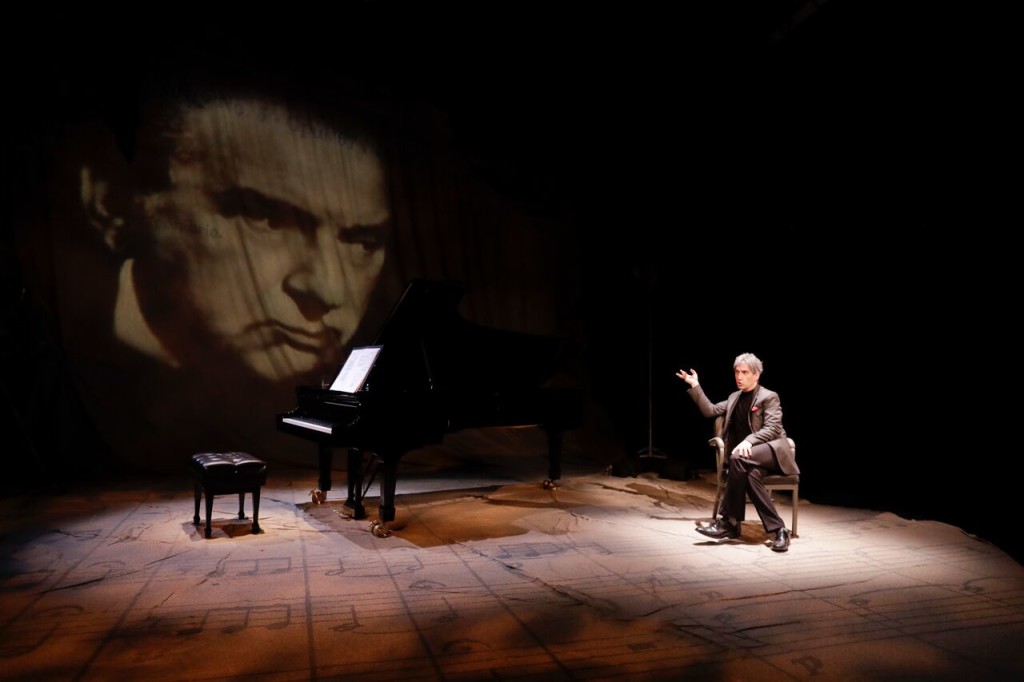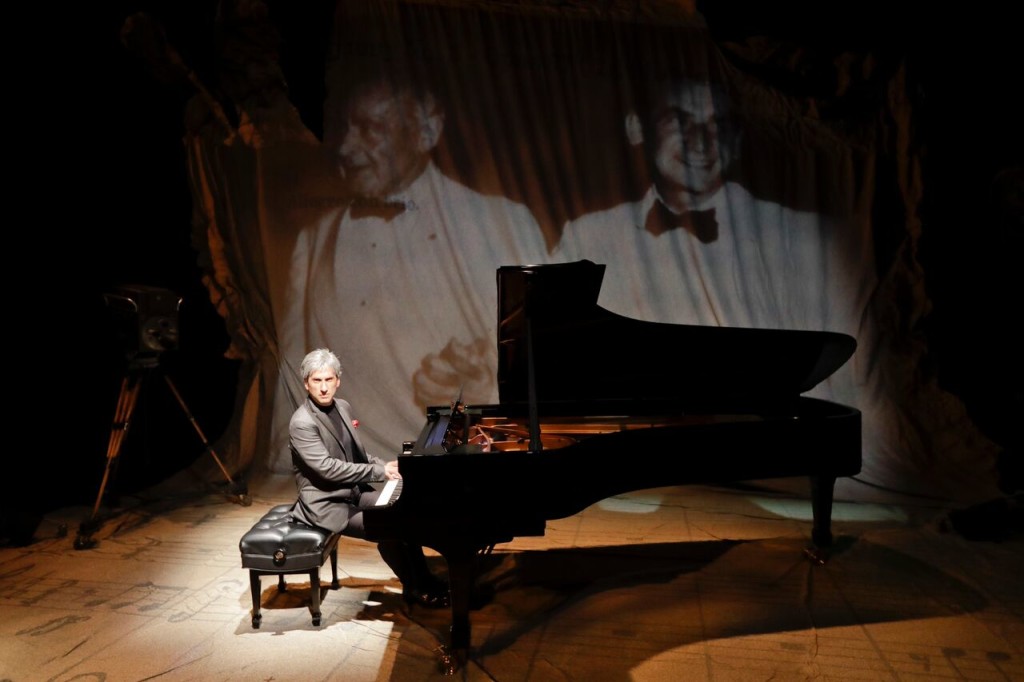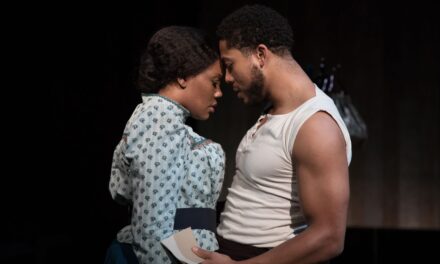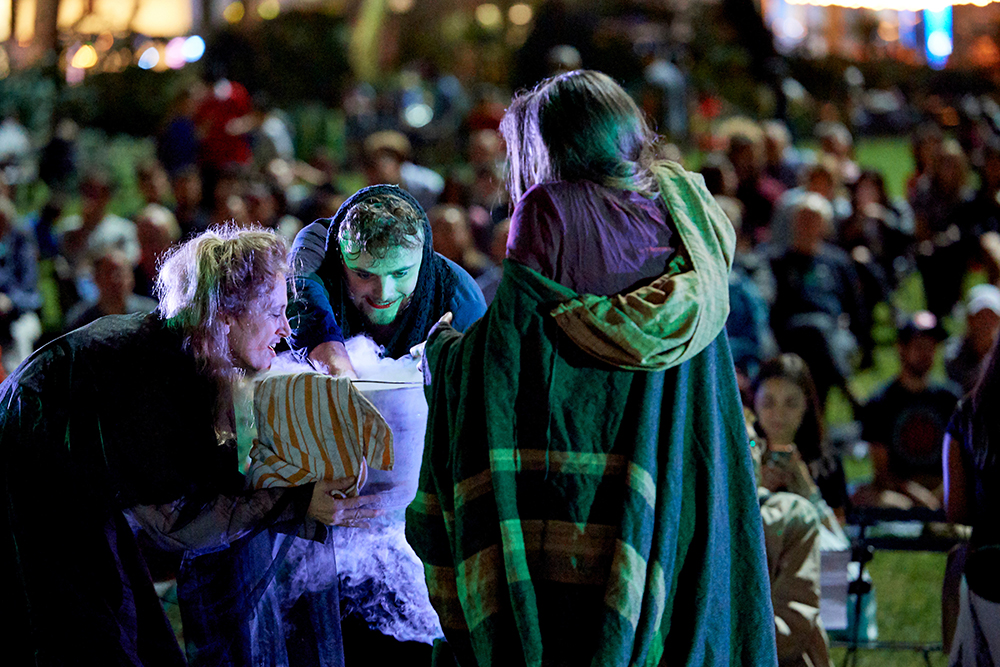by Carol Rocamora
Watching Maestro, Hershey Felder’s inspiring one-man show about the life of Leonard Bernstein, I wondered who to admire more – the subject of this bio-play or the remarkable artist who wrote and performed it.
Felder, a Canadian born actor, pianist, composer, and theatre artist, has cornered a unique market – the solo show about the lives of great musicians. He has been performing the parts of his illustrious “Composer Sonata” – including George Gershwin Alone; Monsieur Chopin; Beethoven; Franz Liszt in Musik; Hershey Felder as Irving Berlin – nationally and internationally for decades.
And now, at 59E59 Theaters, he’s performing Maestro, the story of one of the greatest musicians of our time. Leonard Bernstein has been called America’s “Mr. Music” – acclaimed conductor, composer, pianist, teacher, theorist, and ambassador of music all over the world. With skill and care, Felder has compressed Bernstein’s moving life story into an exhilarating one-and-three-quarter-hour show that spans a century (1918-1990).
Employing the first-person narrative, Felder reenacts Bernstein’s young years with humor and insight – beginning with his childhood discovery of music on his family’s piano in Massachusetts; his rich Jewish heritage; his struggle with a devout, disapproving father; his ambition to become “the next great American composer;” his years at Boston Latin and at Harvard; and his musical education. With actorly panache, Felder plays the young Bernstein as well as the greats who influenced him, giving colorful impersonations of Aaron Copland (who first saw Bernstein’s potential as a conductor), as well as Fritz Reiner and Serge Koussevitsky (who taught him conducting).
Moving on, Felder charts Bernstein’s meteoric rise to musical fame in the 1940s – beginning with the call from Artur Rodzinski at the Philharmonic inviting him to serve as assistant conductor, provided that he change his name to sound “less Jewish” (Bernstein refused). Then came word that Bruno Walter was ill and Bernstein would need to replace him on the following matinee (November 14, 1943). Felder-as-Bernstein remembers the “lesson of generosity” that the ailing Walter gave him, reviewing every note of the scores Bernstein would have to conduct on less than 24 hours notice. “A genius!” the reviews exclaimed. When asked about his son’s amazing accomplishment, his father replied: “How was I supposed to know that he was ‘Leonard Bernstein’?”
Next, Felder-as-Bernstein moves through the 1950s, touching on the professional and personal highlights that included his triumphant appointment as conductor of the Philharmonic at age 39. Still, his abiding passion was for composition, and his original works during that decade included Symphony No. 1: Jeremiah and Symphony No. 3: Kaddish (“I had become the world’s musical rabbi…I was always looking for God and love”). Then came West Side Story (1957), his contentious collaboration with Jerome Robbins (“first it was the Jews vs the Catholics… then it was the Puerto Ricans”). “We changed musical theatre forever,” says Felder/Bernstein of that landmark musical.
For the final decades of Bernstein’s life, Felder focuses on his marriage to actress Felicia Montealegre (1951), their family life (three children), Bernstein’s bisexuality, the couple’s separation, Felicia’s tragic death, and Bernstein’s continued international fame. “I put music on television front and center,” Felder/Bernstein claims. But he always felt he fell short of becoming a great composer.
What makes Maestro soar is the sublime music – played with artistry and flair by Mr. Felder, an accomplished pianist himself. As Felder narrates the story of “Lenny’s” life in the first person, he intersperses it with pieces by Bernstein and others he admired (Copland). While images of great composers who inspired Bernstein (Beethoven, Wagner, Mahler) are projected on the upstage scrim of Francois-Pierre Couture’s spare set, Felder sits at a grand piano, playing excerpts from West Side Story and Candide, as well as his less familiar compositions (including a delightful “I Hate Music”). In the final moving moments, the celestial strains and lyrics of “Somewhere” summarize the brilliance of this remarkable life.
Watching Hershey Felder’s charismatic, passionate, transforming performance, and considering Felder’s own impressive career that continues to climb to greater heights (his next show will be Our Great Tchaikovsky), one senses there is a lot of “Lenny” in Hershey.
Hershey Felder as Leonard Bernstein in Maestro; book by Hershey Felder; music by Leonard Bernstein and others; directed by Joel Zwick; produced by The Town Hall with Samantha F. Voxakis and Karen Racanelli at 59E59 Theaters, now through October 16.

























